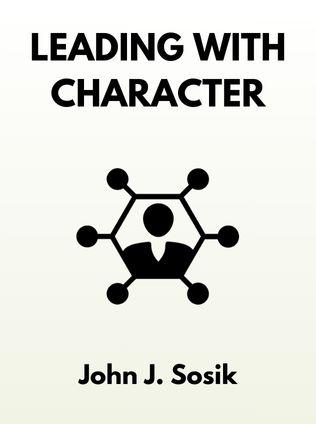
Leading With Character
Stories of Valor and Virtue and the Principles They Teach
By John J. Sosik
Published 08/2006
About the Author
John J. Sosik is a prominent scholar in the fields of management and leadership. He serves as a professor of management and organization at Pennsylvania State University's Great Valley School of Graduate Professional Studies. Sosik has dedicated his academic career to exploring the intricate relationships between leadership, character, and positive psychology. His work is widely recognized for its depth and practical insights, making him a respected voice in the discourse on leadership development. Sosik's research interests are particularly focused on how character strengths and virtues influence leadership effectiveness, which he extensively discusses in his book "Leading with Character: Stories of Valor and Virtue and the Principles They Teach."
Main Idea
"Leading with Character" by John J. Sosik is an exploration of the essential role that character strengths and virtues play in effective leadership. Sosik argues that the current crisis in leadership, characterized by widespread ethical failures and a lack of public trust, stems from a neglect of fundamental moral principles. The book presents 23 principles of leading with character, illustrated through the lives and actions of well-known figures who exemplify these virtues. Sosik emphasizes that authentic leadership is not merely about achieving results but about doing so in a manner that upholds ethical standards and fosters positive relationships. By examining the lives of diverse leaders, from historical figures like Dr. Martin Luther King Jr. to contemporary examples like Pat Tillman, Sosik provides a blueprint for cultivating leadership that is both effective and principled.
Table of Contents
- The Leadership Crisis
- Making the Case for Authentic Transformational Leadership
- Virtues and Character Strengths
- Wisdom and Knowledge: Strengths for Stimulating Vision and Ideas
- Courage: Strengths for Weaving Moral Fiber
- Humanity: Strengths for Developing Others
- Justice: Strengths for Role Modeling
- Temperance: Strengths for Keeping the Ego in Check
- Transcendence: Strengths for Inspiring Greatness
- Reaching a Higher Level of Leadership and Prosperity
The Leadership Crisis
The opening chapter of "Leading with Character" addresses a significant concern in contemporary society: the leadership crisis. A 2005 Harvard University study revealed a pervasive lack of confidence in leaders across various sectors, including business, politics, and religion. The study highlighted that nearly two-thirds of Americans believe that the nation is experiencing a leadership crisis, with doubts about leaders' honesty, integrity, and ethical standards. Sosik attributes this crisis to a superficial focus on leadership styles rather than substantive issues of character and virtue. He suggests that the emphasis on charisma and managerial skills has overshadowed the importance of moral and ethical considerations in leadership.
"We may have focused too much attention on issues of style, while ignoring issues of true substance—character and virtue." - John J. Sosik
Sosik argues that to address this crisis, society needs to redefine its understanding of what constitutes true leadership. Rather than merely managing or directing, true leaders must inspire and elevate others through a commitment to ethical principles and virtuous behavior. The crisis, therefore, is not just a matter of capability but of moral deficiency. The remedy lies in cultivating leaders who prioritize character and integrity over expedience and personal gain.
Making the Case for Authentic Transformational Leadership
In this chapter, Sosik builds a compelling case for authentic transformational leadership, a concept rooted in the work of leadership scholars worldwide. Authentic transformational leadership is characterized by ethical behavior, genuine self-awareness, and a deep commitment to developing positive relationships with followers. Sosik references James MacGregor Burns' definition of transformational leadership, which describes it as an influence process that elevates both leaders and followers to higher levels of motivation and morality.
Sosik emphasizes that authentic leaders are not merely concerned with the end goals but also with the means by which those goals are achieved. This approach contrasts sharply with transactional leadership, which focuses on exchanges and rewards. Instead, transformational leaders inspire and empower their followers, fostering a sense of shared purpose and moral integrity.
The book identifies the "Four I's" of transformational leadership:
- Idealized Influence: Leaders who embody high ethical standards and serve as role models, inspiring respect and admiration from their followers.
- Inspirational Motivation: Leaders who articulate a compelling vision that energizes and motivates their followers to achieve more than they thought possible.
- Intellectual Stimulation: Leaders who encourage creativity, innovation, and critical thinking, challenging followers to think outside the box and approach problems from new perspectives.
- Individual Consideration: Leaders who provide personalized mentorship and support, recognizing and nurturing the unique potential of each follower.
Sosik highlights that these behaviors are not innate but can be developed through intentional practice and self-reflection. By embodying these principles, leaders can create environments that promote ethical behavior, innovation, and personal growth.
Virtues and Character Strengths
The foundation of authentic transformational leadership, according to Sosik, lies in six core virtues: wisdom, courage, humanity, justice, temperance, and transcendence. These virtues are universally recognized as essential qualities for ethical and effective leadership. Each virtue is associated with specific character strengths that leaders can cultivate to enhance their effectiveness and positively impact their followers.
Sign up for FREE and get access to 1,400+ books summaries.
You May Also Like
The Subtle Art of Not Giving a F*ck
A Counterintuitive Approach to Living a Good Life
By Mark MansonRich Dad Poor Dad
What the Rich Teach Their Kids About Money - That the Poor and Middle Class Do Not!
By Robert T. KiyosakiHow To Win Friends and Influence People
The All-Time Classic Manual Of People Skills
By Dale CarnegieQuiet: The Power of Introverts
The Power of Introverts in a World That Can't Stop Talking
By Susan Cain



















